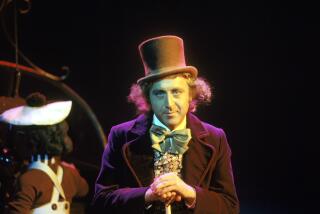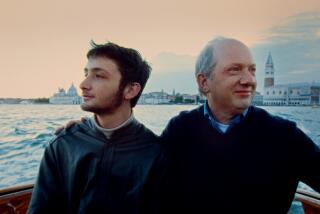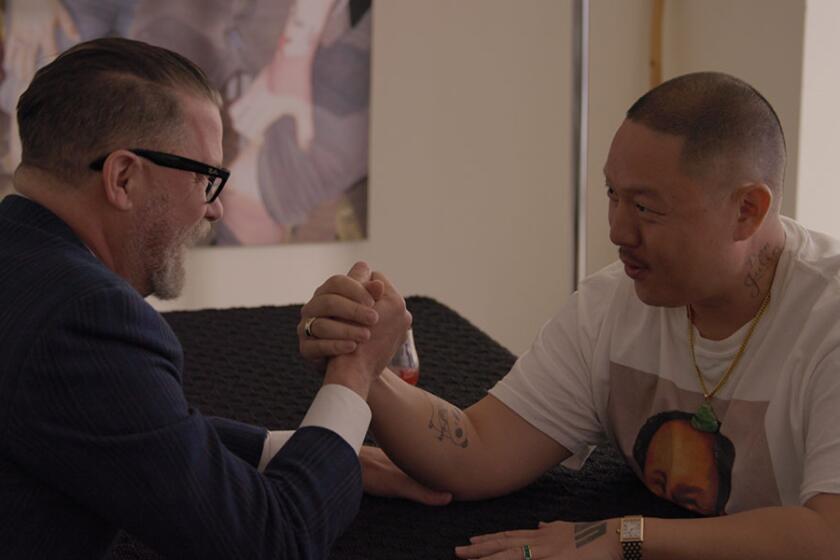Billy Wilder lived on many streets
Because writer-director Billy Wilder cast such a perceptive eye on American culture, customs and morality in such classics as “Double Indemnity,” “The Lost Weekend” and “The Apartment,” it’s easy to forget that he hailed from Vienna and spent his early creative life in Berlin before the rise of Nazism caused him to flee -- first to Paris and then to the U.S.
The UCLA Film and Television Archive’s “Billy Wilder’s Europe,” which begins Saturday -- quite aptly -- at the Billy Wilder Theater, features a number of the late Oscar winner’s films that reflect his origins. The lineup includes 1929’s “People on Sunday,” considered by some critics to be the last important German silent film, for which he co-wrote the script, and the 1934 French comic thriller “Mauvaise Graine,” which marked Wilder’s feature directorial debut. Other highlights include two romantic comedies set in Paris: 1957’s “Love in the Afternoon” and 1963’s “Irma La Douce”; the 1961 farce “One, Two, Three,” set in Berlin; and 1957’s British courtroom thriller “Witness for the Prosecution.”
“He had a very strong feeling for Europe,” says Charlotte Chandler, author of “Nobody’s Perfect: Billy Wilder a Personal Biography.” “He had 26 years of German memories in Germany and then a year of French memories and then America. He loved America so much, but he couldn’t lose that [German] accent.”
Wilder, she adds, would often say he felt like a man without a country. “Even though he loved America and that was the country he chose and wanted and was grateful to, he always thought a lot about Europe when he was in America. In a way, a little of him belonged to a lot of places.”
In cinematic terms, says UCLA programmer David Pendleton, Wilder equated Europe with his mentor, director Ernst Lubitsch, who had come to America in the early 1920s and excelled at sophisticated, witty comedies. Wilder was one of the screenwriters on Lubitsch’s 1939 classic “Ninotchka,” starring Greta Garbo.
“Wilder got a lot of mileage in the 1950s and to some extent in the 1960s satirizing certain brasher aspects of American life,” says Pendleton. “The European films, for the most part, are mellower than the films set in the States. You look at ‘Love in the Afternoon’ or ‘The Private Life of Sherlock Holmes.’ I also think that we can see some of the personal side of Wilder in the films set in Europe. . . . I think in some ways returning to Europe and revisiting Europe was going back and revisiting his earlier self.”
But returning to Europe also brought up painful memories because his mother, Eugenia, died during World War II, though no one is sure whether it was in Auschwitz or another camp. “But it was a part of his life and a part of him,” says Chandler. “He was a much more sentimental and nostalgic person than people realized. He was perceived as kind of cynical, but he didn’t think he was cynical.
“He was a good friend and had a generous spirit.”
Though it was rumored that Wilder and his “One, Two, Three” star James Cagney didn’t get along, Chandler says they liked each other, though the veteran actor didn’t like the rapid-fire dialogue he had to deliver. “I remember when I spoke with [the film’s costar] Horst Buchholz, he said he found James Cagney dancing one morning as fast as you can imagine. Cagney said he was dancing that fast because it helped him get up to speed verbally.”
--
--
‘Billy Wilder’s Europe’
Where: Billy Wilder Theater, 10899 Wilshire Blvd., Westwood.
When: 7:30 p.m. Saturday through Aug. 29
Price: $7 to $9
Contact: (310) 206-FILM or go to www.cinema.ucla.edu
--
Schedule
Saturday: “People on Sunday,” “Mauvaise Graine”
Aug. 21: “Irma La Douce”
Aug. 24: “One, Two, Three,” “Love in the Afternoon”
Aug. 29: “The Private Life of Sherlock Holmes,” “Witness for the Prosecution”
More to Read
Only good movies
Get the Indie Focus newsletter, Mark Olsen's weekly guide to the world of cinema.
You may occasionally receive promotional content from the Los Angeles Times.








